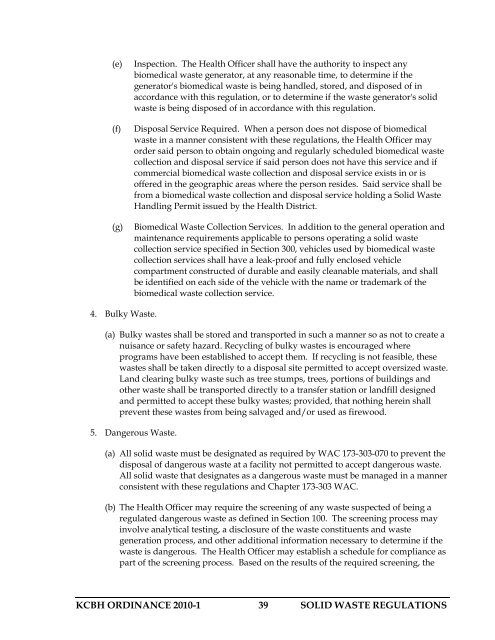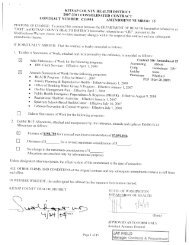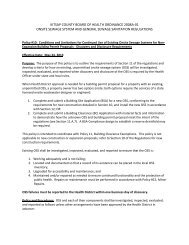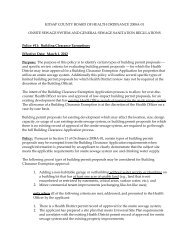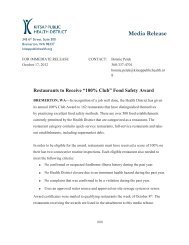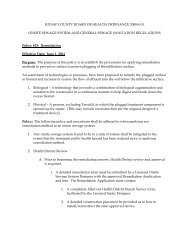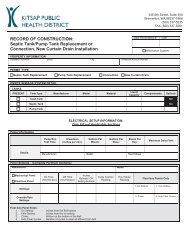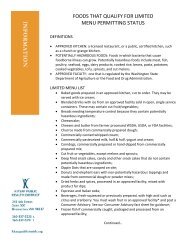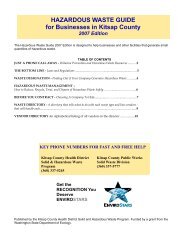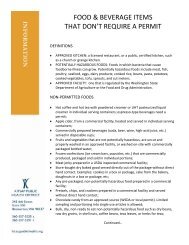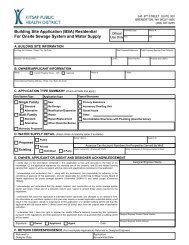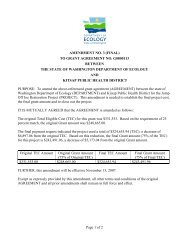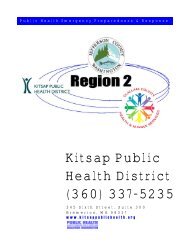SOLID WASTE REGULATIONS - Kitsap Public Health District
SOLID WASTE REGULATIONS - Kitsap Public Health District
SOLID WASTE REGULATIONS - Kitsap Public Health District
You also want an ePaper? Increase the reach of your titles
YUMPU automatically turns print PDFs into web optimized ePapers that Google loves.
(e)<br />
(f)<br />
(g)<br />
Inspection. The <strong>Health</strong> Officer shall have the authority to inspect any<br />
biomedical waste generator, at any reasonable time, to determine if the<br />
generator's biomedical waste is being handled, stored, and disposed of in<br />
accordance with this regulation, or to determine if the waste generator's solid<br />
waste is being disposed of in accordance with this regulation.<br />
Disposal Service Required. When a person does not dispose of biomedical<br />
waste in a manner consistent with these regulations, the <strong>Health</strong> Officer may<br />
order said person to obtain ongoing and regularly scheduled biomedical waste<br />
collection and disposal service if said person does not have this service and if<br />
commercial biomedical waste collection and disposal service exists in or is<br />
offered in the geographic areas where the person resides. Said service shall be<br />
from a biomedical waste collection and disposal service holding a Solid Waste<br />
Handling Permit issued by the <strong>Health</strong> <strong>District</strong>.<br />
Biomedical Waste Collection Services. In addition to the general operation and<br />
maintenance requirements applicable to persons operating a solid waste<br />
collection service specified in Section 300, vehicles used by biomedical waste<br />
collection services shall have a leak-proof and fully enclosed vehicle<br />
compartment constructed of durable and easily cleanable materials, and shall<br />
be identified on each side of the vehicle with the name or trademark of the<br />
biomedical waste collection service.<br />
4. Bulky Waste.<br />
(a) Bulky wastes shall be stored and transported in such a manner so as not to create a<br />
nuisance or safety hazard. Recycling of bulky wastes is encouraged where<br />
programs have been established to accept them. If recycling is not feasible, these<br />
wastes shall be taken directly to a disposal site permitted to accept oversized waste.<br />
Land clearing bulky waste such as tree stumps, trees, portions of buildings and<br />
other waste shall be transported directly to a transfer station or landfill designed<br />
and permitted to accept these bulky wastes; provided, that nothing herein shall<br />
prevent these wastes from being salvaged and/or used as firewood.<br />
5. Dangerous Waste.<br />
(a) All solid waste must be designated as required by WAC 173-303-070 to prevent the<br />
disposal of dangerous waste at a facility not permitted to accept dangerous waste.<br />
All solid waste that designates as a dangerous waste must be managed in a manner<br />
consistent with these regulations and Chapter 173-303 WAC.<br />
(b) The <strong>Health</strong> Officer may require the screening of any waste suspected of being a<br />
regulated dangerous waste as defined in Section 100. The screening process may<br />
involve analytical testing, a disclosure of the waste constituents and waste<br />
generation process, and other additional information necessary to determine if the<br />
waste is dangerous. The <strong>Health</strong> Officer may establish a schedule for compliance as<br />
part of the screening process. Based on the results of the required screening, the<br />
KCBH ORDINANCE 2010-1 39 <strong>SOLID</strong> <strong>WASTE</strong> <strong>REGULATIONS</strong>


